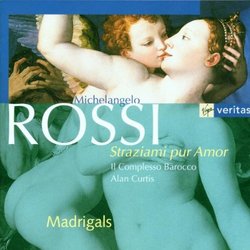| All Artists: Rossi, Il Complesso Barocco, Curtis Title: Michelangelo Rossi: Straziami pur Amor (Madrigals) / Il Complesso Barocco / Alan Curtis Members Wishing: 1 Total Copies: 0 Label: EMI Classics Imports Release Date: 7/11/2000 Genres: Pop, Classical Styles: Vocal Pop, Opera & Classical Vocal, Chamber Music, Historical Periods, Baroque (c.1600-1750), Classical (c.1770-1830) Number of Discs: 1 SwapaCD Credits: 1 UPC: 724354522024 |
Search - Rossi, Il Complesso Barocco, Curtis :: Michelangelo Rossi: Straziami pur Amor (Madrigals) / Il Complesso Barocco / Alan Curtis
 | Rossi, Il Complesso Barocco, Curtis Michelangelo Rossi: Straziami pur Amor (Madrigals) / Il Complesso Barocco / Alan Curtis Genres: Pop, Classical
|
Larger Image |
CD Details |
CD ReviewsI Knew Him When... Giordano Bruno | Wherever I am, I am. | 09/05/2008 (5 out of 5 stars) "Not Micky Rossi... he was before my time. No, I mean Alan Curtis, who used to be a semi-divine professor of musicology at the University of California Berkeley, an austere genius who occasionally produced remarkable concerts, the Monteverdi Vespers for instance, coaxing glorious sounds out of student choristers and part-time instrumentalists. And then he abandoned academia, fled to Italy, and founded Il Complesso Barocco, a fabulous ensemble featuring Italian singers of the caliber of soprano Roberta Invernizzi and specializing in the repertoire of the Italian madrigalists and operatists. The story is familiar. An American goes to Europe and finds the resources to express his genius. Curtis's productions on DVD of early operas are the finest fruit on the tree, and his CDs with Il Complesso Barocco include several of my all-time favorites, especially the recordings of duets selected from Monteverdi's total corpus of music. William Christie, another old acquaintance from college days in New England, also exiled himself to Europe, to become the most exciting conductor of French Baroque on the block. Why couldn't Curtis and Christie have achieved equal musical success in the United States? Ask your local Congressperson.
Michelangelo Rossi (1602-1656) was born in Genoa and worked in the musical service of Cardinal Maurizio of Savoy, who was a lavish patron of the arts during his years as the 'lobbyist' for Savoy in Rome. Rossi's madrigals were never published and survive in only a handful of undated manuscripts, the most ample of which is now in the library of... the University of California Berkeley! There of two books of five-voice madrigals in the manuscript; the first is recorded entirely on this CD. Rossi seems to have worked closely with Sigismondo d'India, a slightly better known composer of extremely chromatic/dramatic madrigals. Both were contemporaries of the great Monteverdi, who by that time was working in Venice. Monteverdi claimed most of the credit for developing the "concitato" style of madrigal/opera composition - "concitato" meaning "agitated or "excited" - but these madrigals by Rossi probably predate Monteverdi's later publications. In other words, Rossi was a participant in the Birth of the Baroque. If you've ever seen the sculpture and architecture of baroque Rome, the Bernini fountains for instance, you'll understand what "concitato" means in music. Not all of Rossi's madrigals are agitated and dissonant. In fact, more than half are quite old-fashioned and could have been written a hundred years earlier. They are sweetly harmonic, poetic, artfully polyphonic. Il Complesso Barocco sings them so well, and adds such elegant improvised continuo on lute and harpsichord, that they sound fresher and more interesting than they look on the page. A few of the selections, nevertheless, are truly unexpected - utterly bold in use of chromatic progressions and dissonances that would have arrested the attention even of Gesualdo or of any 20th C experimentalist. However 'concitato' they become, they succeed both as music and as drama. Curtis has chosen to vary the texture of these madrigals, according to the freedom typical of performance practices in Rossi's era, by adding quite elaborate instrumental continuo, substituting instruments for voices at times, and even performing several madrigals purely instrumentally as string ensembles. Curtis also plays five of Rossi's highly original toccatas for solo harpsichord, interspersed among the madrigals, and Curtis is no slouch at the keyboard. Once again, the performance is so polished that one has the perhaps premature impression of Rossi as a towering musical genius whose works have been tragically overlooked until now. But hey, friends, what you hear is what you hear; whether the glory belongs to Micky or Al, this is a superb CD." |

 Track Listings (22) - Disc #1
Track Listings (22) - Disc #1